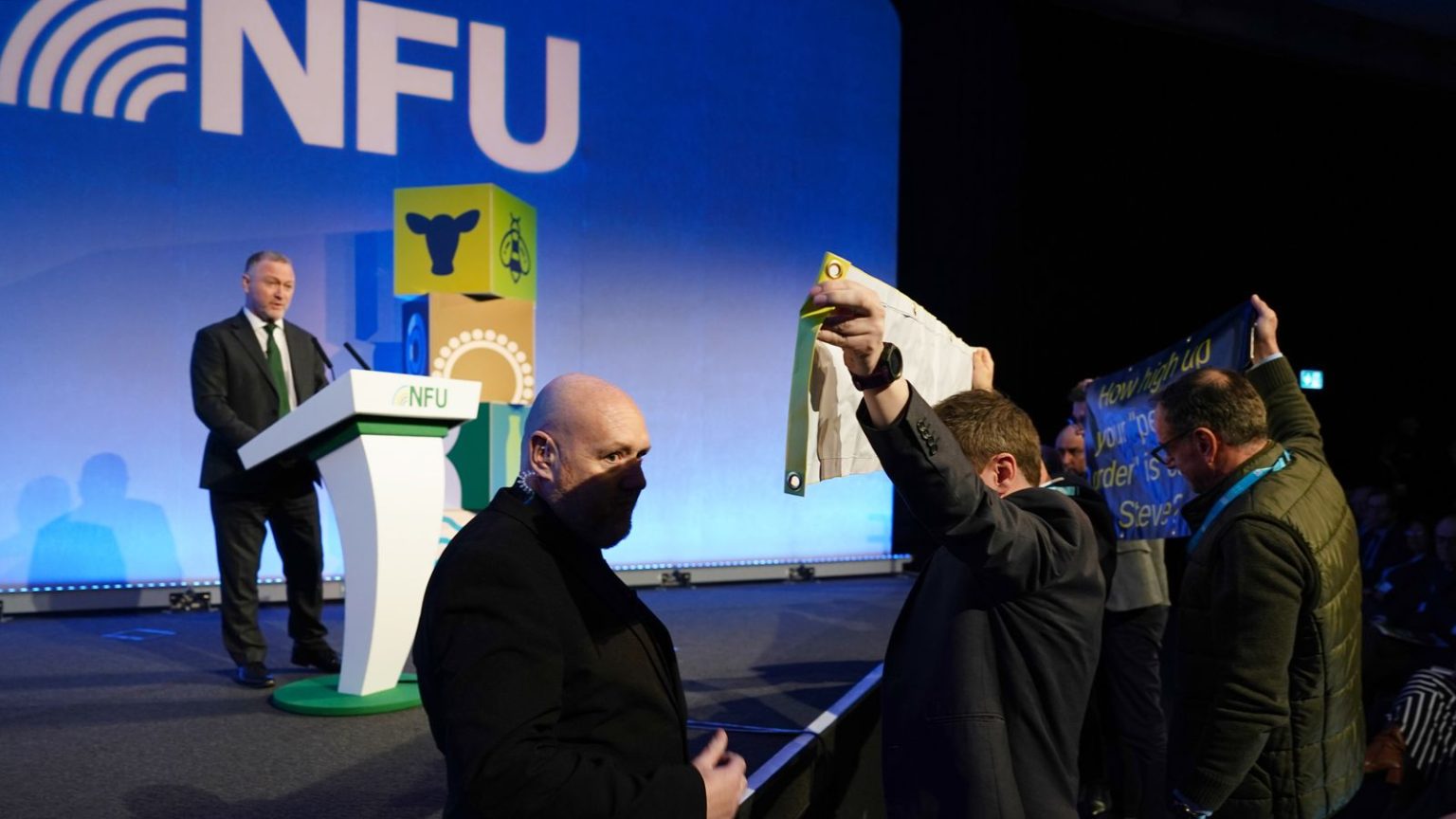A Tense Encounter: The Environment Secretary’s Speech Interrupted by Protesters
The National Farmers’ Union (NFU) conference became the backdrop for a tense and dramatic showdown between the UK’s Environment Secretary, Steve Reed, and a group of angry protesters. The main point of contention was the government’s controversial decision to impose a 20% inheritance tax on farms worth over £1 million, set to come into effect in April 2026. As Mr. Reed began his speech, he was quickly interrupted by protesters holding banners that expressed their outrage over the new tax policy. The atmosphere in the room was charged with frustration and disappointment, as the farming community made their displeasure known.
Despite the interruption, Mr. Reed pressed on, acknowledging the strong emotions in the room. However, he made it clear that the government could not reverse the decision on inheritance tax, stating, "I’m sorry, it’s a decision that we have had to take." The audience’s response was muted, and the mood remained hostile, indicating the deep divide between the government and the farming community on this issue.
Policy Sweeteners Announced Amidst Tension
In an effort to ease the tension and address the concerns of the farming community, Steve Reed unveiled a series of policy measures designed to support farmers and boost their profitability. One of the key announcements was the long-awaited extension of the seasonal worker visa programme by five years. This move is expected to provide much-needed certainty for farmers who have struggled with labor shortages since the UK’s departure from the European Union. The extension is particularly important for sectors like agriculture, where seasonal workers play a crucial role in ensuring food production remains stable.
Additionally, Mr. Reed announced £30 million in funding to increase payment rates for higher-level stewardship schemes. This investment aims to encourage farmers to adopt more sustainable farming practices and improve the environmental health of their lands. The government also introduced new requirements for public sector catering contracts, ensuring that British produce is prioritized. This move is intended to boost demand for locally sourced food and support British farmers.
Moreover, the environment secretary revealed plans for a multimillion-pound investment in technology designed to strengthen controls on animal disease and protect farmers in international trade deals. These measures are part of a broader strategy to make farming businesses more resilient to external shocks, such as disease outbreaks and fluctuations in global markets.
Anger Over Inheritance Tax Policy Dominates the Discussion
Despite the policy announcements, the inheritance tax issue overshadowed the event, with palpable anger evident among the farming community. NFU President Tom Bradshaw delivered a scathing critique of the policy, describing it as "cruel" and "morally wrong." He highlighted the emotional and financial burden the tax would place on older farmers, many of whom are now faced with the difficult decision of whether to pass on their farms to their families or face the risk of losing them due to unaffordable tax bills.
Bradshaw emphasized that the tax policy feels like a betrayal, especially given previous assurances that agricultural land would remain exempt from such taxes. He called on the government to reconsider the policy, urging them to "correct this urgently." The NFU president’s words struck a chord with the audience, as many farmers feel that their way of life and the future of their family farms are under threat.
Supporters of the inheritance tax policy argue that it will help reduce tax avoidance and promote a more equitable distribution of land. They claim that the current system allows some individuals to exploit agricultural property for tax benefits, and that the new rules will bring agricultural land values more in line with market values. However, these arguments have done little to assuage the concerns of farmers, who fear that the policy will lead to the closure of small, family-run farms.
Steve Reed Stands Firm on Inheritance Tax Decision
During the question-and-answer session following his speech, Steve Reed faced further challenges as farmers expressed their concerns and frustrations. When asked about the potential consequences of the inheritance tax policy, he acknowledged the individual hardships but maintained that the government had no choice but to introduce the tax. He pointed to the financial challenges inherited from the previous Conservative government and the need to stabilize the economy, suggesting that the tax is a necessary measure to address these issues.
Reed also emphasized the importance of making farms more profitable, stating that this is the key to solving the underlying problems in the farming sector. He expressed his determination to improve the financial stability of farmers, saying, "I will consider my time as the secretary of state a failure if I do not improve profitability for farmers up and down this country." However, his words did little to ease the anger in the room, as many farmers feel that the government is prioritizing tax revenues over the survival of rural communities.
NFU Applauds Seasonal Worker Visa Extension
Amid the controversy over the inheritance tax policy, there was some positive news for farmers. The NFU welcomed the extension of the seasonal worker visa programme, calling it a "key ask of ours for many years." The organisation highlighted the importance of this decision in safeguarding the future of UK food production. Since the UK’s departure from the EU, there has been a significant shortfall in the number of seasonal workers available to pick crops, leading to food being left unpicked and resulting in millions of pounds in lost revenue for the agriculture industry.
By extending the visa programme, the government aims to address this issue and ensure that farmers have access to the labor they need to maintain production levels. The NFU believes that this move will provide much-needed certainty for farmers and help to stabilize the food supply chain. However, while this announcement was well-received, it did not overshadow the ongoing concerns about the inheritance tax policy.
A Roadmap for the Future of Farming
As the conference drew to a close, Steve Reed outlined plans for a 25-year farming roadmap and food strategy, designed to prioritize food production and build resilience in the farming sector. The strategy aims to make farm businesses better equipped to handle challenges such as severe weather events, animal disease outbreaks, and market fluctuations. Reed emphasized the importance of maintaining high food standards in trade agreements, stating, "Ours is an outward-facing trading nation, but I want to be clear that we will never lower our food standards in trade agreements."
While these long-term plans were seen as a positive step forward, they did not address the immediate concerns of farmers regarding the inheritance tax policy. As the conference came to an end, it was clear that the relationship between the government and the farming community remains strained. The environment secretary’s commitment to improving farm profitability will be put to the test in the coming months, as farmers continue to call for urgent action on the inheritance tax issue.
Conclusion: A Call for Dialogue and Action
The NFU conference highlighted the deep divide between the government and the farming community over the inheritance tax policy. While Steve Reed and his team have introduced several measures to support farmers, the anger and frustration over the tax policy remain unresolved. For farmers, this issue is not just about money but about the future of their families, their land, and their way of life.
As the UK looks to the future of its agriculture sector, it is clear that the government must engage in meaningful dialogue with farmers to find a solution that balances the need for tax reforms with the need to protect rural communities. The NFU has vowed to continue fighting for the rights of farmers, and the environment secretary will need to demonstrate his commitment to improving the profitability and sustainability of farms if he hopes to rebuild trust with the farming community. Only time will tell if the government’s policies will be enough to address the challenges facing British agriculture, but for now, the tension remains.















